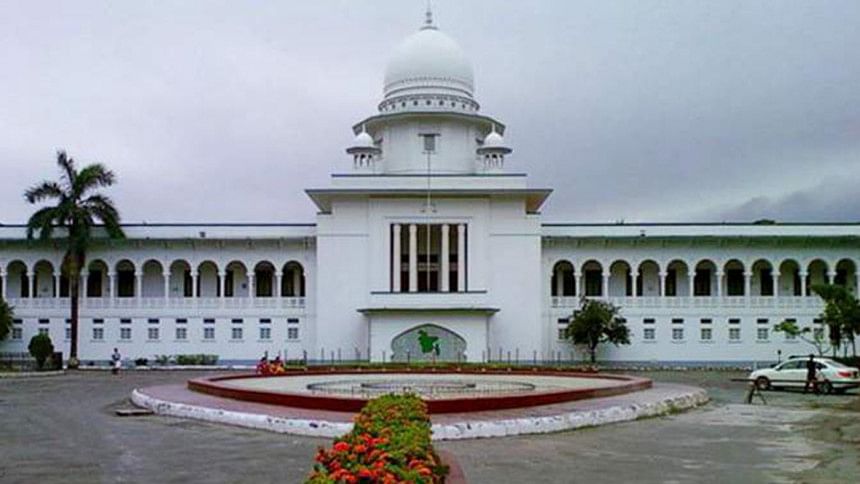SC authority over lower courts intact

The Supreme Court yesterday accepted the disciplinary rules formulated by the government for the lower court judges.
The rules will uphold the supremacy of the SC, and it has not lost its powers over the subordinate courts because of them, the apex court said.
A five-member bench of the SC, headed by Justice Md Abdul Wahhab Miah, now discharging the duties of the chief justice, passed the acceptance order during a hearing in the Masder Hossain case, popularly known as the separation of the judiciary case.
The apex court, however, kept the Masder Hossain case as a continuous mandamus, meaning that this court can pass any further order on the issue if deemed necessary in future.
Meanwhile, Bangladesh Judicial Service Association (BJSA) yesterday decided to withdraw Dr Kamal Hossain and Barrister M Amir-Ul Islam from the responsibility of conducting Masder Hossain case on behalf of the BJSA.
The decision came two days after six leading jurists, including Dr Kamal and Amir-Ul Islam, said in a joint statement that “the lower courts have been made subordinate to the executive by three cardinal rules”.
BJSA President MA Kuddus Zaman and acting secretary general Bikash Kumar Saha said the six jurists are doing politics over the Masder Hossain case.
They also said the arguments placed by Barrister M Amir-Ul Islam before the SC bench yesterday opposing the disciplinary rules for lower court judges are not acceptable and are against the interest of lower court judges.
In their statement on Monday, the six jurists said the protection of the independence of the judiciary has been undermined and the separation of power has been violated by the rules. But they did not specify those rules.
The four other jurists are -- Rafique-ul Huq, Mainul Hosein, Fida M Kamal and AF Hasan Ariff.
On December 11 last year, the law ministry, as per the SC directive, issued a gazette notification on the rules titled “Bangladesh Judicial Service (Discipline) Rules 2017” for the lower court judges.
Later, the law ministry submitted the notification to the apex court through the attorney general's office.
Under the rules, the president will make necessary decisions in consultation with the SC, and the law ministry will then implement those.
The president can also appoint an investigation officer or form a three-member committee to conduct probe into any allegations brought against a lower court judge.
Following the SC order yesterday, the attorney general told reporters at his office that the gazette notification on the disciplinary rules has come into effect as the SC accepted those.
The SC's opinion will have priority regarding different issues, including enquiry, investigation and punishment of lower court judges if any differences arise between the opinions of the president, the law ministry and the SC over any issue, he said.
Some individuals have written articles in newspapers and said in TV talk-shows that the SC's power has been curtailed through the disciplinary rules. But this is wrong as there is a provision in the disciplinary rules for soliciting advice from the SC at every stage regarding the lower court judges, he added.
WHAT BARRISTER AMIR SAID
Contacted, Barrister Amir-Ul Islam told The Daily Star that he is now placing arguments before the SC in the Masder Hossain case on behalf of Md Masder Hossain, a retired district judge.
Masdar was the then secretary general of the BJSA which had filed the writ petition with the High Court in 1995 for separating the judiciary from the executive, he said.
“I have been moving the case on behalf of Masder Hossain, as he has given me the power to move the case,” Barrister Amir said, adding that he is not a lawyer for the BJSA now.
MASDER HOSSAIN'S COMMENTS
Asked, Masder told this correspondent that the government formulated the disciplinary rules for lower court judges under Article 133 of the constitution, but it was not right.
The rules were supposed to have been made under Article 116 of the constitution, he said, adding that the disciplinary rules made by the government are against Article 116 of the constitution and against the apex court verdict in the (Masder Hossain) case.
He said the government can formulate the rules under Article 133 of the constitution only for administrative officials, but the disciplinary rules were made for the judicial officials (lower court judges) instead.
The 1972 constitution has to be restored for the full independence of the judiciary and its complete separation from the executive, Masder added.
Following the writ petition filed by Masder and several other judicial officials, the High Court in May, 1997, had directed the government to take necessary steps to separate the judiciary from the executive.
The then government had appealed to the SC against the HC verdict.
On December 2, 1999, the SC had upheld the HC verdict and delivered 12 directives for separating the judiciary from the executive.
From the beginning of the case, Dr Kamal and Barrister Amir have been moving the case for a complete separation of the judiciary from the executive.

 For all latest news, follow The Daily Star's Google News channel.
For all latest news, follow The Daily Star's Google News channel. 







Comments